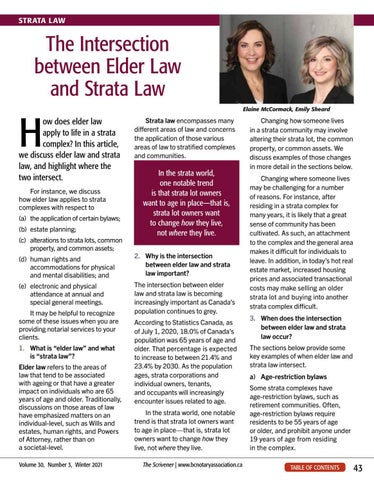STRATA LAW
The Intersection between Elder Law and Strata Law
H
ow does elder law apply to life in a strata complex? In this article, we discuss elder law and strata law, and highlight where the two intersect. For instance, we discuss how elder law applies to strata complexes with respect to (a) the application of certain bylaws; (b) estate planning; (c) alterations to strata lots, common property, and common assets;
Elaine McCormack, Emily Sheard
Strata law encompasses many different areas of law and concerns the application of those various areas of law to stratified complexes and communities.
In the strata world, one notable trend is that strata lot owners want to age in place—that is, strata lot owners want to change how they live, not where they live.
(d) human rights and accommodations for physical and mental disabilities; and
2. Why is the intersection between elder law and strata law important?
(e) electronic and physical attendance at annual and special general meetings.
he intersection between elder T law and strata law is becoming increasingly important as Canada’s population continues to grey.
It may be helpful to recognize some of these issues when you are providing notarial services to your clients. 1. What is “elder law” and what is “strata law”? Elder law refers to the areas of law that tend to be associated with ageing or that have a greater impact on individuals who are 65 years of age and older. Traditionally, discussions on those areas of law have emphasized matters on an individual-level, such as Wills and estates, human rights, and Powers of Attorney, rather than on a societal-level. Volume 30, Number 3, Winter 2021
ccording to Statistics Canada, as A of July 1, 2020, 18.0% of Canada’s population was 65 years of age and older. That percentage is expected to increase to between 21.4% and 23.4% by 2030. As the population ages, strata corporations and individual owners, tenants, and occupants will increasingly encounter issues related to age. In the strata world, one notable trend is that strata lot owners want to age in place—that is, strata lot owners want to change how they live, not where they live. The Scrivener | www.bcnotaryassociation.ca
Changing how someone lives in a strata community may involve altering their strata lot, the common property, or common assets. We discuss examples of those changes in more detail in the sections below. Changing where someone lives may be challenging for a number of reasons. For instance, after residing in a strata complex for many years, it is likely that a great sense of community has been cultivated. As such, an attachment to the complex and the general area makes it difficult for individuals to leave. In addition, in today’s hot real estate market, increased housing prices and associated transactional costs may make selling an older strata lot and buying into another strata complex difficult. 3. When does the intersection between elder law and strata law occur? The sections below provide some key examples of when elder law and strata law intersect. a) Age-restriction bylaws Some strata complexes have age-restriction bylaws, such as retirement communities. Often, age-restriction bylaws require residents to be 55 years of age or older, and prohibit anyone under 19 years of age from residing in the complex. TABLE OF CONTENTS
43






























